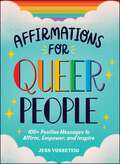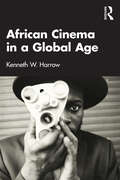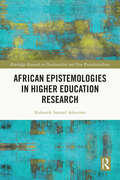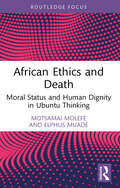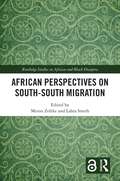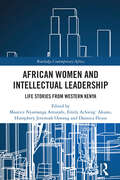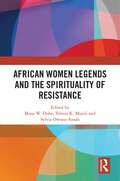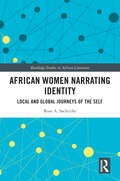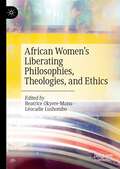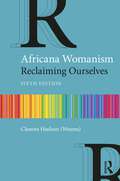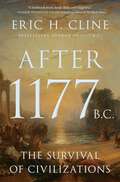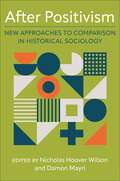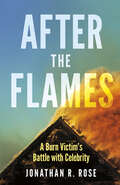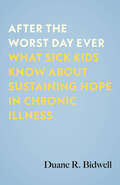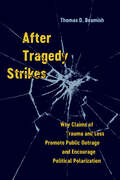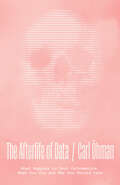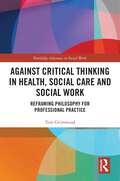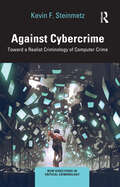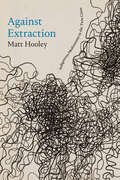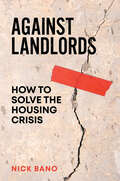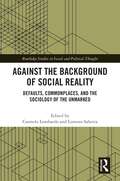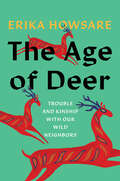- Table View
- List View
Affirmations for Queer People: 100+ Positive Messages to Affirm, Empower, and Inspire
by Jess VosseteigCelebrate your resilience and bravery in the face of discrimination and empower yourself and your community with these 100+ affirmations for queer people that celebrate being LGBTQIA+.Queer people are essential members of society—trailblazing for positive change and building up a stronger and more vibrant community every day. It&’s time to affirm these truths and so many more with Affirmations for Queer People. In this book, discover more than 100 affirmations to empower yourself, emphasize your self-worth, care for your mental health and emotional well-being, and so much more. You can use these affirmations and the accompanying texts to reflect on your own life and your future. You&’ll find amazing, inclusive artwork throughout that speaks to the beauty, bravery, and diversity of this incredible community. With Affirmations for Queer People, celebrate being a queer person, affirm your talent and worth, and bring your dreams to fruition.
Africa-EU Relations and the African Continental Free Trade Area: Redefining the Dynamics of Power and Economic Partnership in a Complex Global Order
by Samuel Ojo Oloruntoba Leon Mwamba TshimpakaThis book examines the establishment and implementation of the AfCFTA, which is the largest free trade area globally, covering 54 African countries. It explores how this initiative has the potential to reshape Africa-EU relations by promoting intra-African trade, economic integration, and diversification, as well as inter- regional trade. Both continents have potential to serve as global actors in reshaping the global order in ways that can affect how multilateralism foster inclusive development. However, whether this will happen would be a function of how the EU and AU define their interests and relationship.
African Cinema in a Global Age
by Kenneth W. HarrowThis book traces the developments in African films that were made from the 1990s to the present within the evolving frame of what came to be called ‘World Cinema’ and, eventually, ‘Global Cinema.’ Kenneth W. Harrow explores how, from the time video and then digital technologies were introduced in the 1990s, and then again, when streaming platforms assumed major roles in producing and distributing film between the 2010s and 2020s, African cinema underwent enormous changes. He highlights how the introduction of the continent’s first successful commercial cinema, Nollywood, shifted the focus from engagé films, with social or political messages, to entertainment movies, but also auteur cinema. Harrow explores how this transformation liberated African filmmakers and resulted in an incredible, enduring flow of creative, inventive, and thoughtful filmmaking. This book presents a number of those critical films that mark that trajectory, projecting a new sense of African film spaces and temporalities, while also highlighting how African films continue to find independent pathways. This book will be of interest to students and scholars of African cinema and world cinema, as well as researchers specifically examining African cinemas and their relationship to globalization.
African Cinema in a Global Age
by Kenneth W. HarrowThis book traces the developments in African films that were made from the 1990s to the present within the evolving frame of what came to be called ‘World Cinema’ and, eventually, ‘Global Cinema.’Kenneth W. Harrow explores how, from the time video and then digital technologies were introduced in the 1990s, and then again, when streaming platforms assumed major roles in producing and distributing film between the 2010s and 2020s, African cinema underwent enormous changes. He highlights how the introduction of the continent’s first successful commercial cinema, Nollywood, shifted the focus from engagé films, with social or political messages, to entertainment movies, but also auteur cinema. Harrow explores how this transformation liberated African filmmakers and resulted in an incredible, enduring flow of creative, inventive, and thoughtful filmmaking. This book presents a number of those critical films that mark that trajectory, projecting a new sense of African film spaces and temporalities, while also highlighting how African films continue to find independent pathways. This book will be of interest to students and scholars of African cinema and world cinema, as well as researchers specifically examining African cinemas and their relationship to globalization.
African Epistemologies in Higher Education Research (Routledge Research on Decoloniality and New Postcolonialisms)
by Kolawole Samuel AdeyemoBringing a needed perspective on African Epistemologies on the critical topics of higher education in relation to knowledge systems, this book highlights how knowledge creation processes influence higher education systems, society, and African development. This book uses an interdisciplinary approach to frame the connections between academic knowledge systems. Specifically, it seeks to answer questions on the trends in knowledge mobility, histories, and sociological dimensions in knowledge production in post-colonial Africa. The discussion explores how existing knowledge systems can better align with past and present narratives throughout African history and philosophies. The primary thought behind this book is to deconstruct the idea of a free market, the issue of corruption, racism and the neoliberalist approach to knowledge creation and transmission. Thus, it seeks to answer questions on the history and sociological dimensions of knowledge production in higher education. The book argues that African epistemologies can be better understood by investigating present sociologies and histories shaping African higher education research. Researchers and university students in the field of sociology of education, economics of education, higher education and policy will find this book very useful.
African Ethics and Death: Moral Status and Human Dignity in Ubuntu Thinking (Routledge Studies in African Philosophy)
by Motsamai Molefe Elphus MuadeThis book analyzes the concepts of moral status and human dignity in African philosophy and applies them to the moral problems associated with death. The book first challenges the criticism and rejection of moral status in African philosophy and then continues to consider how moral personhood is defined in African ethical theories, investigating which entities have full moral status or moral personhood and are therefore worthy of full ethical consideration. It then applies this theory to the problems associated with death. In the medical context, will an African theory of moral status permit or forbid euthanasia? Do we have moral obligations towards dead human bodies? Overall, the book provides an important African axiological contribution to debates on global ethics and moral philosophy. Providing an important overview of the ethical problems associated with the biological fact of death, this book will be of interest to researchers across the fields of philosophy and African studies.
African Perspectives on South–South Migration (Routledge Studies on African and Black Diaspora)
by Lahra SmithThis book investigates the diverse and dynamic forms of migration within Africa. It will be crucial reading for researchers, students, and policy makers with a focus on South-South Migration, Migration and Inequalities, Migration and Development, and Refugee and Humanitarian Studies.
African Women and Intellectual Leadership: Life Stories from Western Kenya (ISSN)
by Maurice Nyamanga Amutabi Emily Achieng’ Akuno Humphrey Jeremiah Ojwang Dannica FleussThis book highlights the pioneering roles of African women as leaders and role models in Kenya, providing examples taken from across education, health, business, and a range of other sectors. Drawing on authentic first-hand accounts and narratives from key women in leadership positions, and those who have lived with them, the book presents the life stories of women leaders over the last fifty years, aiming to preserve their contributions for posterity and to inspire young people with moral, ethical, and progressive role models. The book uses African knowledge production strategies that look at the human being holistically, in the prism of Ubuntu, in order to define leadership in Africa from an African perspective, one that celebrates the role of the mother figure and places women at the centre of African values and societal dynamics. This book will be of interest to researchers and students of African studies, gender studies, and Kenyan education and socio-political history.
African Women Legends and the Spirituality of Resistance
by Musa W. Dube Telesia K. Musili Sylvia Owusu-AnsahThis volume focuses on African indigenous women legends and their potential to serve as midwives for gender empowerment and for contributing towards African feminist theories. It considers the intersection of gender and spirituality in subverting patriarchy, colonialism, anthropocentricism, and capitalism as well as elevating African women to the social space of speaking as empowered subjects with public influence. The chapters examine historical, cultural, and religious African women legends who became champions of liberation and their approach to social justice. The authors suggest that their stories of resistance hold great potential for building justice-loving Earth Communities. This book will be of interest to scholars of religion, gender studies, indigenous studies, African studies, African-indigenous knowledges, postcolonial studies, among others.
African Women Narrating Identity: Local and Global Journeys of the Self (Routledge Studies in African Literature)
by Rose A. SackeyfioThis book examines the complexities of women’s lives in Africa and the transnational spaces of Europe and North America through the literary works of key African women writers. Using a postcolonial analytical framework, the book highlights the commonalities of African women’s identities and experiences across national, ethnic, linguistic, and religious boundaries in Africa and in western settings. It collates the multi-regional narratives of key African women writers who convey how women’s lives are shaped by social, economic, and political factors at home and abroad. It also illustrates the intersection of ethnicity, class, and gender that flows through all the texts examined. Unlike existing works that explore African women’s fiction, this book uncovers the transformation from postcolonial themes of nationhood to global modalities of post-independence writing through the lens of gender. The book engages with feminist expression through broad themes including religion, war and ethnic conflict, women’s status in society, tradition and modernity and local and global tensions. A unique approach to literary criticism of Anglophone African women’s writing, this book will be of interest to scholars and students in the field of African Literature, African Studies, Women’s Literature, Postcolonial Literature, Cultural and Ethnic Studies and Migration and Diaspora Studies.
African Women’s Liberating Philosophies, Theologies, and Ethics
by Beatrice Okyere-Manu Léocadie LushomboThis volume explores the ethical and philosophical paradigms presented by most of the influential Matriarchs of the Circle of African Women Theologians. It critically evaluates the effectiveness of their ethical and philosophical theories, models, and frameworks in pursuing justice and liberation for women in Africa and globally. The authors address critical questions: How have African women theologians reimagined existing ethical paradigms? What original ethical and philosophical ideas have they generated? How have their ethical frameworks influenced the theologies and interpretations they have developed? What purposes do their ethical and philosophical paradigms serve? How do these renderings intersect with various social categories, including gender, race, class, sexuality, capitalism, and colonialism? What liberating frameworks do they propose? The volume further explores the dialogue between distinct African contexts and universal experiences and values. It explores how universal themes such as humanity, human dignity, rights, justice, motherhood, and more can coexist with communal African concepts and themes. It contemplates how embracing African approaches engages these themes more globally, bringing together particular African contexts of women and the universal ethical, philosophical, and theological theories, models, and frameworks to advance the cause of justice and liberation for African women and women worldwide into the future.
Africana Womanism: Reclaiming Ourselves
by Clenora Hudson (Weems)The sixth edition of Africana Womanism provides important updates to the classic text in which Clenora Hudson (Weems) sets out a paradigm for women of African descent. Differentiating itself from the problematic theories of Western feminisms, Africana Womanism allows an establishment of cultural identity and relationship directly to ancestry and land. Introduced in the mid-1980s, Africana Womanism offers a new term and paradigm for women of African descent, a family-centered concept, prioritizing race, class, and gender. This new edition includes an Africana Womanist reading of Angie Thomas’ twenty-first-century novel, The Hate U Give, continuing existing Africana Womanist readings of twentieth-century novels by Hurston, Bâ, Marshall, Morrison, and McMillan; a Prologue, a previously unpublished interview with the author; a revised conclusion; updated bibliographies; an updated annotated bibliography; and a new section outlining key questions, clarifications, considerations, and commentaries surrounding Africana Womanism in relation to other female-based theories. Africana Womanism remains an important work and essential reading for researchers and students in women and gender studies, Africana studies, African American studies, literary studies, and cultural studies.
Africana Womanism: Reclaiming Ourselves
by Clenora Hudson (Weems)A classic in African American Studies and Gender Studies.Sixth edition will feature a new chapter discussing Angie Thomas' The Hate You Give.Outlines a novel, non-western notion of 'womanism' rather than 'feminism'.
After 1177 B.C.: The Survival of Civilizations (Turning Points in Ancient History #12)
by Eric H. ClineIn this gripping sequel to his bestselling 1177 B.C., Eric Cline tells the story of what happened after the Bronze Age collapsed—why some civilizations endured, why some gave way to new ones, and why some disappeared forever&“A landmark book: lucid, deep, and insightful. . . . You cannot understand human civilization and self-organization without studying what happened on, before, and after 1177 B.C.&”—Nassim Nicholas Taleb, bestselling author of The Black SwanAt the end of the acclaimed history 1177 B.C., many of the Late Bronze Age civilizations of the Aegean and Eastern Mediterranean lay in ruins, undone by invasion, revolt, natural disasters, famine, and the demise of international trade. An interconnected world that had boasted major empires and societies, relative peace, robust commerce, and monumental architecture was lost and the so-called First Dark Age had begun. Now, in After 1177 B.C., Eric Cline tells the compelling story of what happened next, over four centuries, across the Aegean and Eastern Mediterranean world. It is a story of resilience, transformation, and success, as well as failures, in an age of chaos and reconfiguration.After 1177 B.C. tells how the collapse of powerful Late Bronze Age civilizations created new circumstances to which people and societies had to adapt. Those that failed to adjust disappeared from the world stage, while others transformed themselves, resulting in a new world order that included Phoenicians, Philistines, Israelites, Neo-Hittites, Neo-Assyrians, and Neo-Babylonians. Taking the story up to the resurgence of Greece marked by the first Olympic Games in 776 B.C., the book also describes how world-changing innovations such as the use of iron and the alphabet emerged amid the chaos.Filled with lessons for today's world about why some societies survive massive shocks while others do not, After 1177 B.C. reveals why this period, far from being the First Dark Age, was a new age with new inventions and new opportunities.
After Positivism: New Approaches to Comparison in Historical Sociology
by Wilson, Nicholas Hoover; Mayrl, DamonWhat is the value of comparison for research in historical sociology? Today, social scientists regularly express doubt about the positivist premises that have long justified comparison’s use: that cases can be unproblematically compared as though they are independent of one another, that comparison can reliably yield valid causal inference, and that comparative methods can grapple with questions of meaning, sequence, and process that are central to historical explanation. Yet they remain reluctant to abandon comparison altogether, not least because comparisons are still manifestly useful in the research process.After Positivism presents a bold new set of warrants and methodologies for comparison that takes these criticisms fully into account. The contributors to this book marshal a wide array of postpositivist approaches to knowledge to reconstruct the analytic potential of comparison for a new generation of social scientists. In addition to providing fresh answers to classic questions about case selection and causal inference, authors ponder the role comparison plays in a world where social phenomena are demonstrably time-, space-, and concept-dependent; where causation is typically conjunctural; where social structures and groups emerge and die; and where important objects of inquiry can be understood only in terms of relationships, emergent properties, or contingent and irregular effects. Engaging and timely, this book will be of interest to all those who seek to improve our explanations of historical change in social-scientific research.
After the Flames: A Burn Victim's Battle With Celebrity
by Jonathan R. Rose“A fast-paced, compelling narrative that goes far beyond the headlines.” — KEVIN DONOVAN, author of The Billionaire MurdersFor Joey Philion, surviving the fire was only the beginning.On the morning of March 10th, 1988, in Orillia, Ontario, a house fire engulfed fourteen-year-old Joey Philion in flames. He suffered third degree burns on 95 percent of his body. Doctors didn’t think he would make it through the night.After the Flames is about one of the world's most famous burn victims: his incredible survival, his nightmarish path to recovery that helped revolutionize medical treatment for burn victims worldwide, the fame thrust upon him after he was declared a hero from the media, and the tumultuous years that followed, most of which were spent under the microscope of an unforgiving public eye.The story also follows Joey’s family, including his mother Linda, stepfather Mike, and younger brother Danny, all of whom endured their own tremendous hardships in the wake of a fire that changed their lives forever.
After the Worst Day Ever: What Sick Kids Know About Sustaining Hope in Chronic Illness
by Duane R. BidwellFor those who care for chronically ill children, a new understanding of hope that equips adults to better nurture pediatric hope among sick kids—articulated by the children themselvesAs anyone with a chronic illness knows, hope can sometimes be hard to come by. For parents and caregivers of children with serious illness, there can be a real struggle to move beyond one's own grief, fear, and suffering to see what hope means for these kids.Duane Bidwell, a scholar, minister, and former hospital chaplain who has struggled with serious illness himself, spent time with 48 chronically ill children in dialysis units and transplant clinics around the United States. Chronically ill kids, he found, don&’t adhere to popular or scholarly understandings of hope. They experience hope as a sense of well-being in the present, not a promise of future improvement, an ability to set goals, or the absence of illness and suffering. With this mindset, these kids suggest a new understanding of pediatric hope, saying hope becomes concrete when they (1) realize community, (2) claim power, (3) attend to Spirit, (4) choose trust, and (5) maintain identity.Offering textured portraits of children with end-stage kidney disease, After the Worst Day Ever illustrates in their words how sick children experience, maintain, and turn toward hope even when illness cannot be cured and severely limits quality of life. Their insights reveal how the adults in a sick child's world—parents, chaplains, medical professionals, teachers, and others—can nurture hope. They also shift our understanding of hope from an internal resource located &“inside&” an individual to a shared, communal experience that becomes a resource for individuals.Rich and moving, Bidwell&’s work helps us imagine anew what it means to sustain hope despite inescapable suffering and the limits of chronic illness.
After Tragedy Strikes: Why Claims of Trauma and Loss Promote Public Outrage and Encourage Political Polarization
by Thomas D. BeamishWhile trauma and loss can occur anywhere, most suffering is experienced as personal tragedy. Yet some tragedies transcend everyday life's sad but inevitable traumas to become notorious public events: de facto "public" tragedies. In these crises, suffering is made publicly visible and lamentable. Such tragedies are defined by public accusations, social blame, outpourings of grief and anger, spontaneous memorialization, and collective action. These, in turn, generate a comparable set of political reactions, including denial, denunciation, counterclaims, blame avoidance, and a competition to control memories of the event. Disasters and crises are no more or less common today than in the past, but public tragedies now seem ubiquitous. After Tragedy Strikes argues that they are now epochal—public tragedies have become the day's definitive social and political events. Thomas D. Beamish deftly explores this phenomenon by developing the historical context within which these events occur and the role that political elites, the media, and an emergent ideology of victimhood have played in cultivating their ascendence.
The Afterlife of Data: What Happens to Your Information When You Die and Why You Should Care
by Carl ÖhmanA short, thought-provoking book about what happens to our online identities after we die. These days, so much of our lives takes place online—but what about our afterlives? Thanks to the digital trails that we leave behind, our identities can now be reconstructed after our death. In fact, AI technology is already enabling us to “interact” with the departed. Sooner than we think, the dead will outnumber the living on Facebook. In this thought-provoking book, Carl Öhman explores the increasingly urgent question of what we should do with all this data and whether our digital afterlives are really our own—and if not, who should have the right to decide what happens to our data. The stakes could hardly be higher. In the next thirty years alone, about two billion people will die. Those of us who remain will inherit the digital remains of an entire generation of humanity—the first digital citizens. Whoever ends up controlling these archives will also effectively control future access to our collective digital past, and this power will have vast political consequences. The fate of our digital remains should be of concern to everyone—past, present, and future. Rising to these challenges, Öhman explains, will require a collective reshaping of our economic and technical systems to reflect more than just the monetary value of digital remains. As we stand before a period of deep civilizational change, The Afterlife of Data will be an essential guide to understanding why and how we as a human race must gain control of our collective digital past—before it is too late.
Against Critical Thinking in Health, Social Care and Social Work: Reframing Philosophy for Professional Practice (Routledge Advances in Social Work)
by Tom GrimwoodThis book stages a provocative dialogue between social work, health and social care and contemporary philosophy in order to inform theory and practice in a complex and challenging world. Today, the social world is marked by deep-rooted complexities, tensions and challenges. Health workers and social workers are constantly reminded to employ critical thinking to navigate this world through their practice. But given how many of these challenges pose significant problems for the theories that these subjects have traditionally drawn upon, should we now be critical of critical thinking – its assumptions, its basis, and its aspirations – itself? Arguing that health and social work theory must reconsider its deep-rooted assumptions about criticality in order to navigate complex neoliberalism, post-truth, and the relationship between language and late capitalism, it examines how the fusion of theory and practice can re-imagine critical thinking for health and social work in social work. It will be of interest to all scholars, students and professionals of social work and health and social care.
Against Cybercrime: Toward a Realist Criminology of Computer Crime (New Directions in Critical Criminology)
by Kevin F. SteinmetzThis book advances a theoretically informed realist criminology of computer crime. Looking beyond current strategies of online crime control, this book argues for a new sort of policy that addresses the root causes of computer crime and criminality, reduces the harms experienced by the victims of such crimes, and does not unduly contribute to state and corporate power and surveillance. Drawing both on the proponents of realist criminology and on those who have leveled critiques of the approach, Steinmetz illustrates the contours of a realist criminology of computer crime by considering definitions of harm with online crime, the idiosyncrasies of online locality and community, the social relations of computer crime, the tension between piecemeal reform and structural changes, and other matters. Furthermore, Steinmetz surveys the methodological dimensions of computer crime research, offers a critique of positivist “computational criminology,” and posits an agenda for computer crime policy. Against Cybercrime is an essential reading for all those engaged with cybercrime, realist criminology, criminological theory, and social harm online.
Against Extraction: Indigenous Modernism in the Twin Cities
by Matt HooleyIn Against Extraction Matt Hooley traces a modern tradition of Ojibwe invention in Minneapolis and St. Paul from the mid-nineteenth century to the present as that tradition emerges in response to the cultural legacies of US colonialism. Hooley shows how Indigenous literary and visual art modernisms challenge the strictures of everyday life and question the ecological, political, and cultural fantasies that make multivalent US colonialism seem inevitable. Hooley analyzes literature and art by Louise Erdrich, William Whipple Warren, David Treuer, George Morrison, and Gerald Vizenor in relation to histories of Indigenous dispossession and occupation, enslavement and Black life, and environmental harm and care. He shows that historical narratives of these cities are intimately bound up with the violence of colonial systems of extraction and that concepts like Indigeneity and sovereignty extend beyond treaty-granted promises of political control. These works, created in opposition and proximity to the extraction of cultural, political, and territorial resources, demonstrate how Indigenous claims to life and land matter to rethinking and unmaking the social and ecological devastations of the colonial world.
Against Landlords: How to Solve the Housing Crisis
by Nick BanoWhen landlords always win and renters pay the price, what can be done?Housing means prosperity and security for some; poverty, precarity and sickness for others. More people live in private rented accommodation than ever before, and rents rise without apparent reason. Homes are smaller every year, and nearly 20 per cent of tenants live in hazardous conditions. Homelessness is at a new high. Yet the government&’s only solution is to promote homeownership.Against Landlords shows that this crisis is not the product of happenstance or political incompetence. Government policy has intentionally split British citizens into homeowners and renters, two classes set on very different financial paths. In the UK, one out of every twenty-one adults is a landlord, and it is this group, and those who aspire to join it, represented by the political class.In his radical new interpretation of the housing crisis, lawyer Nick Bano explains how this environment set the conditions for the Grenfell Tower fire and how it means a life of anxiety for the nation&’s renters. It is a problem that stretches far beyond London and one inherently racist in nature.Building more housing is not the solution. It is firstly a problem of the law, Bano argues, and reforms must sweep away the landlordism at the heart of the housing crisis and British political life.
Against the Background of Social Reality: Defaults, Commonplaces, and the Sociology of the Unmarked (Routledge Studies in Social and Political Thought)
by Carmelo Lombardo Lorenzo SabettaThe first wide-ranging, organic analysis of the sociology of unmarkedness and taken-for-grantedness, this volume investigates the asymmetry between how we attend to the culturally emphasized features of social reality and ignore the culturally unmarked ones. Concerned with the structures of cultural invisibility, unconscious rules of irrelevance, automatic frames of meaning, and collective attention patterns, it brings together scholarship spanning sociology, anthropology, and social psychology, to cover various aspects of humdrum, unglamorous, nondescript, nothing-to-write-at-home-about social phenomena, developing the key assumptions, underpinnings, and implications of this field of study.As comprehensive analysis of unremarked features of our social existence, this book will appeal to scholars across the social sciences with interests in social theory and the sociology of everyday life.
The Age of Deer: Trouble and Kinship with our Wild Neighbors
by Erika HowsareA masterful hybrid of nature writing and cultural studies that investigates our connection with deer—from mythology to biology, from forests to cities, from coexistence to control and extermination—and invites readers to contemplate the paradoxes of how humans interact with and shape the natural worldDeer have been an important part of the world that humans occupy for millennia. They&’re one of the only large animals that can thrive in our presence. In the 21st century, our relationship is full of contradictions: We hunt and protect them, we cull them from suburbs while making them an icon of wilderness, we see them both as victims and as pests. But there is no doubt that we have a connection to deer: in mythology and story, in ecosystems biological and digital, in cities and in forests. Delving into the historical roots of these tangled attitudes and how they play out in the present, Erika Howsare observes scientists capture and collar fawns, hunters show off their trophies, a museum interpreter teaching American history while tanning a deer hide, an animal-control officer collecting the carcasses of deer killed by sharpshooters, and a woman bottle-raising orphaned fawns in her backyard. As she reports these stories, Howsare&’s eye is always on the bigger picture: Why do we look at deer in the ways we do, and what do these animals reveal about human involvement in the natural world? For readers of H is for Hawk and Fox & I, The Age of Deer offers a unique and intimate perspective on a very human relationship.
